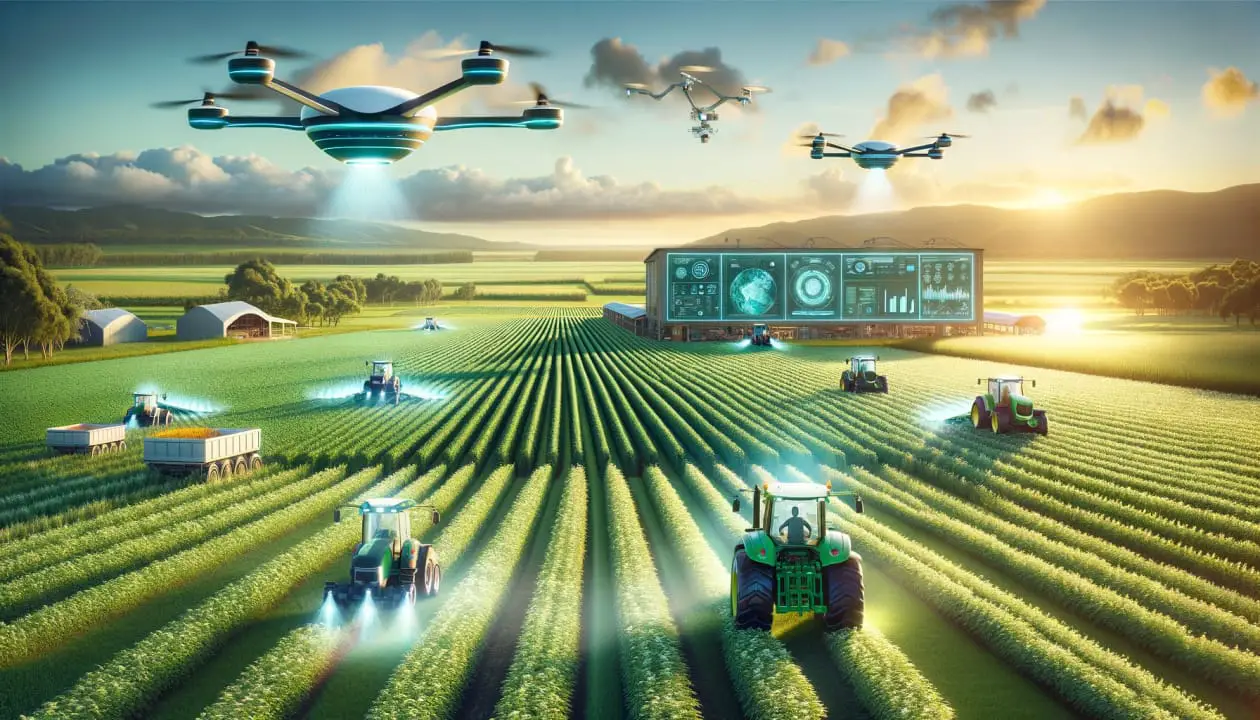The Artificial Intelligence for Agricultural Innovation (AI4AI) initiative was launched in August 2020 by the World Economic Forum’s Centre for the Fourth Industrial Revolution India, in active collaboration with the Government of Telangana and with the support of the Ministry of Agriculture, National Institute for Innovation (NITI) AAYOG and the Ministry of Electronics and Information Technology. The initiative now has over 60 partners in the agriculture industry and emerging technology ecosystem, actively collaborating through weekly workshops from October 2020 to March 2021. https://www.niti.gov.in/
The initiative’s multi-stakeholder community partners have completed a comprehensive review of emerging technology use cases, mapping them against a matrix of feasibility and impact, and categorising them as game changers, long-term interventions and easy wins. This community report is a summary of their findings. It paves the way for the next phase of the initiative, which is to launch pilot projects and compile an evidence-based framework through active learning from the field.
This article will also serve as a guideline document for agriculture leaders from other states in India and other countries across the world to tackle similar challenges in assessing opportunities to leverage emerging technologies. The report helps address some of the unanswered questions around the application of Artificial Intelligence (AI), Internet of Things (IoT), blockchain, drones and data governance in agricultural production systems. In addition, this report provides a platform for agriculture industries, start-ups, technology organizations, telecom and cloud service providers, academia and research institutions to understand the full landscape and provide perspectives to engage through a collaborative framework. Considering the expanse and complexity of agricultural production systems and the burgeoning landscape of emerging technology innovations, addressing the challenges and opportunities raised requires an intense and focused effort. This process requires multi-stakeholder groups of experts with specialized knowledge and experience in AI4AI-related areas.
With this in mind, the initiative convened four working groups with the responsibility to design appropriate plans of action around the four broad themes of the AI4AI initiative: Intelligent Crop Planning, Smart Farming, “Farmgate-to-Fork” and Data-Driven Agriculture.
The composition of the working groups is multi-disciplinary, embodying all the required competencies. Each of the four groups has between 20 and 30 members across government, the start-up ecosystem, industry verticals, civil society, investor groups, and research and academia. All working groups have held weekly meetings and subgroup consultations over a period of 16-18 weeks and consolidated their learnings. The inquiry also convened a steering committee of leadership for government and private stakeholders to coordinate between the working groups, providing them with overall guidance, support and direction, which has enabled them to function effectively and efficiently. The steering committee has also reviewed and validated the frameworks and action plans designed by the working groups.
Each of the four working groups analysed the landscape of opportunities from emerging technologies and shortlisted a set of themes and use cases to capitalise on these opportunities for agricultural innovation, as outlined below:
Intelligent Crop Planning: This Working Group identified seven game-changer use cases across the themes of macro-crop planning and micro-crop planning. Providing advice on sowing windows, analyzing sowing areas, tracking sowing progress, providing advice on crop varieties, and leveraging AI and remote sensing were considered most important for crop planning at the macro level. The Working Group identified several additional priorities: AI-based micro-crop planning models for agricultural input planning, irrigation resource mapping, and rollout of smart extension services for farmers and farmer-producer organizations.
Smart Farming: This Working Group analyzed opportunities for maximizing the benefits of emerging technologies across the themes of “farming-as-a-service”, advice for agricultural inputs and crop health management. It identified eight game-changer use cases: IoT-enabled micro irrigation, AI-enabled water resource planning, crop-health protection through smart application of pesticides, AI-enabled agri input advice, remote sensing, smart crop insurance using blockchain-enabled fintech solutions, “uberization” of farm machinery and creation of dynamic e-sow health cards.
Farmgate-to-Fork: This working group focused on four different value chains: cereals and pulses, vegetables, fruits, and plantations (cash crops). It identified five critical use cases leveraging emerging technologies. Measuring quality using AI and spectroscopy, supported by blockchain-enabled traceability, was considered critical to establish trust in value chains. Platforms to promote buyer-seller linkages were the most preferred use cases with the investor community. IoT- and AI-enabled warehousing and logistics systems, along with fintech solutions based on warehousing receipts, were considered the most innovative and disruptive use cases.
Data-driven agriculture: According to research by NASSCOM and MCKINSEY, there is a $65 billion opportunity through enhancing 15 agricultural datasets, including soil health records, crop yields, weather, remote sensing, warehousing, land records, agricultural markets and pest images. The Working Group recommended taking measures to enable agricultural data marketplaces as a collaboration between the government and the private sector, as well as forming public-private partnerships to enable AI and other emerging technology innovations in this critical sector.
Emerging technologies, such as AI, IoT, blockchain and drones – further enabled by unlocking key datasets – offer an unprecedented and unique opportunity to boost the efficiency and effectiveness of agricultural production systems. The key objectives of the AI4AI initiative are: – to enhance digital and financial inclusiveness among smallholder farmers; – to build trust and transparency through quality and traceability; – to protect the environment from unsustainable practices; and – to establish sustainable farm incomes. However, this requires a tal-led approach of responsible governance to manage the negative impacts of technologies, while focusing on creating an enabling environment of coherent data management and capacity building across the value chain.
As next steps, community partners will work towards establishing the framework through pilot projects across identified themes and use cases. The World Economic Forum has a vision to develop AI4AI as a multi-stakeholder platform of national and state governments, industries, start ups and research institutions to fashion frameworks through which emerging technology solutions can be scaled up and adopted across agricultural production systems.
Read Also:
- Artificial Intelligence In Agriculture
- Role Of Artificial Intelligence In Indian Agriculture
- Artificial Intelligence (AI) Techniques Used For Diseases Detection In Agriculture
- Study On Artificial Intelligence Applications Uses In Agriculture
- Advantages And Disadvantages Of Robots In Agriculture
- Role Of Robots In Agriculture
- Artificial Intelligence In Agriculture
- Importance Of Artificial Intelligence And Machine Learning In Agriculture
- Artificial Intelligence (AI) In Agriculture: Current Status And Future Need






